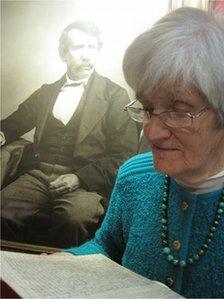David Livingstone's diary to go on show in Blantyre
- Published

Elspeth Murdoch's great-grandfather's diary is to go on show for the first time
A diary written by the Scottish explorer and missionary David Livingstone is to go on public show for the first time.
The journal had been unreadable for over a century due to fading ink.
The pages are known as the Nyangwe Diary, as they detail the massacre of more than 400 Nyangwe villagers in the Congo by slave traders in 1871.
The 200th anniversary of his birth, 19 March, will be celebrated with events around the country.
Livingstone is thought to be the first European to visit the Congo. The diary pages were written on old sheets of newspaper, using make-shift ink Livingstone created from plants and berries, as the explorer had run short of supplies.
Although electronic versions of the diary, made legible by spectral imaging, have been available to read online since 2011 this is the first time the original pages have been on display.
'Important son'
The diary will go on show at the David Livingstone Centre in Blantyre, South Lanarkshire, as part of the commemorations of the bicentenary of his birth.
Livingstone's great-granddaughter, Elspeth Murdoch, from Buchlyvie in Stirlingshire, said: "I think it's amazing that this is his writing on a newspaper that we would never have thought we could read, but thanks to modern technology we can. I think it's wonderful and very impressive.
"I hope everyone else is equally impressed when they look at it and read it. I always want people to keep him in mind because he will always remain as one of our most important sons."
Karen Carruthers, property manager at the David Livingstone Centre said the account of the Nyangwe massacre was significant. She said: "It really affected Livingstone quite profoundly. He was horrified by what he'd seen.
"In later letters and diaries that he wrote he sent information about this massacre and it really helped transform British public opinion and helped bring about an end of the east African slave trade."
- Published23 November 2012
- Published20 June 2012